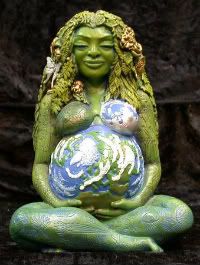Gaia Hypothesis: Does Life Foster Conditions To Sustain Itself?
In my recent post, “Advice to Environmental Policy Makers: Limit Further Damage,” I quoted the late George Carlin: “I love these people who talk about ‘saving the Earth.’ Don’t worry about the planet; the planet will be just fine. It’s people who are going away.” This spawned a few comments about the Gaia hypothesis (the concept that life as a whole fosters and maintains suitable conditions for itself by helping to create a favorable environment on Earth for its continuity).
I’d be very interested to read further discussion on this. It sounds a bit too close to fantasy to have credibility with me — like one of mankind’s many pre-scientific explanations of which we continue to be so fond. In particular, it strikes me as animism (the concept that rocks, thunder, mountains and rivers have souls) — on steroids. It also recalls the “pathetic fallacy,” i.e., attributing human characteristics to inanimate objects, as in “the cruel sea.” Am I missing something?
Having said that, it is interesting to note that the output of every single living organism directly or indirectly becomes food for some other organism.


I agree that the original formation of the Gaia Hypothesis had a strong element of religion that borders on animism. But the restorative effects predicted by this mystical concept are grounded in probability theory. From a purely mechanical point of view it can be shown that the rate of a process is limited by the concentration of the requisite inputs. Each environmental assault disturbs the ecosystem but reverse restorative reactions occur that utilize the products of the initial disturbance.
In simplistic terms, shooting foxes increases the rabbit population but that in turm will restore the fox population because their source of food has been increased.
Larry Lemmert
The world we see with the body’s eyes is a dream, a fantasy, made up of facts and belief in which we have supported with our belief. But belief is a prison. Thru history, we have sought to conquer the eternal with form. But now, you are begining to explore the idea of content. The idea that, “If the world exists in mind, wouldn’t ‘there’ be the place to change it?” I say, it is the only place in can be done at all. The mind as a biodynamic computer can reconfigure itself in proportion to its needs and desires and depth of will.